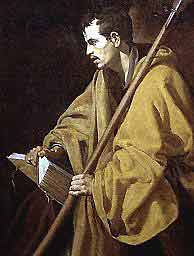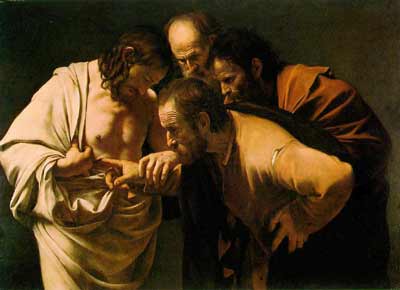
(Matthew 16:13-23)
May these words of this Peter be like a rock,
not a stumbling block!
|
|
"Who do you say
that I am?" Jesus asked. Simon Peter answered, "You
are the Messiah, the Son of the living God." And Jesus
answered, "Blessed are you, Simon son of Jonah! ... You are
Peter (petros), and on this rock (petra)
I will build my church..." Jesus then began to speak of
the rough road ahead. And Peter took him aside and rebuked him... "Get
behind me, Satan!" Jesus replied. "You are a stumbling
block..." (Matthew 16:13-23) May these words of this Peter be like a rock, |
"My Lord..."
Message preached April 18,
2004
Long Green Valley Church of the Brethren
Glen Arm, Maryland USA
based upon John 20:19-31
In a short while, weíll "visit" with the disciple Thomas, using our imagination to remember how hard it was for those first followers to fully comprehend that Jesus was alive. This continues to be a challenge for believers, even today. Concerning this man we will "meet" after the next hymn, we have not received all that much biographical material on Thomas in the Bible. He is but a name in the middle of the list of the twelve disciples in the gospels of Matthew, Mark, and Luke, and in the book of Acts. Itís only in Johnís gospel that his character is fleshed out a bit.
There he is also called "Didymus," a Greek word which means "twin." In fact, the name "Thomas" is a transliteration of a Hebrew word which also means "twin." Apparently being a twin was a significant part of Thomasí identity, but who his twin brother or sister was remains a mystery. This riddle must have captured the imagination of someone in the early church, for in the third or fourth century a book called the "Acts of Thomas" began circulating in which he is considered the twin of none other than Jesus of Nazareth.
While intriguing, the early Christians knew better than to give this idea much credence. Like another work that didnít make it into the New Testament, the "Gospel of Thomas," this fanciful story of how the good news reached India is interesting, but not true to what we have received in the Bible. For instance, it begins with Jesus selling a reluctant Thomas as a slave to a man who needs a carpenter back home in a distant land. If you hear echoes of the story of Joseph in the Old Testament being sold by his brothers into slavery and taken to Egypt, thatís probably intentional.
Our imaginary "Thomas" this morning will stick a bit closer to the word picture of him painted by the gospel of John. However, weíll slide a little on this "twin" enigma, fleshing it out more than the Bible does. Please know, however, that the answer to the riddle of why Thomas is also called "Didymus" is not some sort of secret knowledge necessary for eternal life. "Faith," after all, is not a secret - as the following story reveals. It boils down simply to trusting in something (or should I say, in "someone") you canít touch or see. Listen to gospel storyteller John tells about the first day of resurrection.
Read John 20:19-24
Shalom, Iím
Thomas! ... Youíre supposed to say, "Hi, Thomas." ... My story? It
seems to be the story of my life that I am always a step behind everyone else.
For instance, somebody tells a joke. Can you guess you always seems to be the
last  person in a group to get it? ... Me. When something significant is said,
everyone else eventually gets around to that "Aha!" moment when the
truth of a statement dawns on their awareness - before me. It takes me a while. I
have to mull it over, ponder it, wrestle with it. In a way I need to
"touch" something before I get around to an "Aha!" Itís
always been that way.
person in a group to get it? ... Me. When something significant is said,
everyone else eventually gets around to that "Aha!" moment when the
truth of a statement dawns on their awareness - before me. It takes me a while. I
have to mull it over, ponder it, wrestle with it. In a way I need to
"touch" something before I get around to an "Aha!" Itís
always been that way.
I always seem to arrive late. My parents always said thatís the story of my life. Mother even linked it back to the day of my birth, when my brother and I - we were twins, you know - were in the womb. He was ready and raring to go. I took my own sweet time to be born. Father said that was a characteristic true of all my growing years. Where my brother was first to volunteer an answer in Sabbath school, Iíd wrestle with the answer much longer. He was always ready to jump into something. Me? Iíd get there ... eventually.
I wasnít a lazy sort, mind you. I do good work. I just take my time. As a craftsman, I want what I do to be right. Iíve been told that "you never need to ask Thomas to redo anything. When itís done, itís done well." It just takes me longer to get there. Unlike him. Itís not that my brother was way smarter than me, though sometimes it felt that way. I wasnít dumb. He was just first to arrive. Some might call it "impetuous." It was his downfall, really.
Remember the rebellion against Rome a number of years ago? He quickly joined the zealots when some of them came to town seeking recruits. While I saw the importance of freeing our homeland from the Roman invaders, I just wasnít ready to enroll in that band of guerilla fighters, like my brother. He went off. We never saw him again. They say that when the uprising failed, he was strung up on a cross outside Jerusalem, like all the others. That was how Rome maintained order - making examples for everyone to see what happens to rebels.
A bit of me died then. I stopped going by "Judas," as my folks had named me, and took on my nickname - the twin, "Thomas." Thatís who I was when Jesus called my name a few years later. The teacher came to our town, like the zealots before him. I confess, true to my nature, I wasnít quick to jump on board. It took me a while, but eventually I became his disciple, leaving my home behind, like the others.
He was a marvel - his miracles, his stories. I didnít always understand the things he said. Often, in fact, his words went over my head. Had to ponder them, mull them over, wrestle with them, touch them (if you will). Like after we received word that Lazarus was deathly ill. We all thought that since Lazarus and his sisters (what were their names? ... Mary and Martha) were such close friends of his that he would immediately take off to Bethany where they lived. Heíd healed others, why not his good friend? But no, we just continued on our way elsewhere.
A few days
later he started talking about going to Judea - you know, toward Jerusalem. Thatís
where my brother was crucified. Itís not really where I wanted to go. Too
dangerous, for us and especially so for Jesus. But thatí s where he said we
were headed. Okay. Then, in the middle of the conversation he noted that Lazarus
was now dead ("asleep," he said at first), and it was time to go to
Bethany. "For your sake Iím glad I wasnít there," he said,
"so that you may believe. Letís go!" ... What? He was glad
not to be able to heal his friend? This made no sense to me, so I blurted out.
"Fine! Letís go, that we might die with him!" It was a
stupid thing to say, I know, but as I said, Iím always a step behind everyone
else.
s where he said we
were headed. Okay. Then, in the middle of the conversation he noted that Lazarus
was now dead ("asleep," he said at first), and it was time to go to
Bethany. "For your sake Iím glad I wasnít there," he said,
"so that you may believe. Letís go!" ... What? He was glad
not to be able to heal his friend? This made no sense to me, so I blurted out.
"Fine! Letís go, that we might die with him!" It was a
stupid thing to say, I know, but as I said, Iím always a step behind everyone
else.
Perhaps you heard what happened in Bethany. He went up to the tomb, had them roll away the stone, and yelled, "Lazarus, come out!" The words still ring in my ears (I was standing beside him when he yelled, almost into my ear). Amazingly, Lazarus came out. What did it all mean, though. I didnít know at the time. (see John 11:1-44)
Later, once we were in Jerusalem, he sat us down and started talking about where we were now - or should I say, where he was now heading. "Donít be troubled," he said, "trust me." And then he spoke about going to his fatherís house which, he said, was really big. There was room for everyone. Was he talking about the place his mother now lived in Nazareth? Was he talking about the Temple? What did he mean? I didnít know. "I go to prepare a place there for you," he said, "that where I am you may also be. And you know the way to the place where I am going." Huh? I had no idea what he meant. Where was he going? All I could see was what happened to my brother. "Lord," I said, "we donít know where you are going." Well, at least I didnít. "How can we know the way?"
Then he said those words that Iíve wrestled with ever since. "I am the way, and the truth, and the life. No one comes to the Father except through me" (arms are spread wide as this line is spoken, as if on a cross). Through him? What did he mean? (see John 14:1-7) ... Well, youíve no doubt heard what happened to him. Like my twin brother, he was strung up on a cross outside Jerusalem. When things started falling apart, and he was arrested, and our hearts were, indeed, troubled. An understatement. We were deathly afraid. Ran off like frightened rats.
A few days after his horrid death, we were brave enough to secretly meet together. On that morning the woman told a strange story. They had gone to prepare his body and found the tomb empty. Peter and John checked it out. What did it mean? Had someone stolen the body? I went to find out what I could from my sources in town, but none of them knew anything about who might have taken his body and where.
When I
returned that night, I opened the door on a group of wide-eyed idiots.
"Jesus was just here," they said, "you just missed him" (the
story of my life - always a step behind everyone else). No! Iím not going to
fall for some mass hysteria. Jesus was just as dead as my brother. For Godís
sake, he had been nailed to that crosspiece. Itís my nature to wrestle with
such things, you know. "Unless I see the marks of the nails in his
hands, and touch it, I will not believe." I can be stubborn. It was a
horrible week. Everyone else was higher than a kite. I was depressed.
A week later we were back in the same place, when Jesus came again. This time I was there. "Shalom!" he said, "Peace be with you." And then he turned directly to me. "Thomas, my brother." I could hardly believe my eyes. He told me to touch his hands and his side, where there were still traces of his wounds. "Do not doubt," he said. "Trust me ... believe." What do you say at a time like that. You know the way. Finally, I arrived. Aha! "My Lord and my God!"
My friends, it may have taken me awhile, I might have been a step behind everyone else, but I got there. And the rest, as they say, is history. Iím certainly no smarter than any of you. I do however, have the advantage of having been there. Even then, however, I wrestled with the resurrection. Maybe you do also, and you werenít able to see and touch him like me. Trust me. No, I mean, trust him - even when you canít see.
Allow me just now to pass on the you the blessing he shared that day. "Have you believed because you have seen me?" he asked, looking me in the eyes. "Blessed are those who have not seen and yet have come to believe." Indeed, the Lord has blessed you. Trust him. Heís alive... Shalom! Peace be with you.
When it comes to why this disciple was known as the "twin," an interesting parallel may be the Old Testament story of those twin brothers, Jacob and Esau (Genesis 25:21-34, 27:1-45, 33:1-17). I have somewhat patterned the above on that relationship, wondering if - by repeating the meaning behind Thomasís name (Teíom‚ in Aramaic, Didymos in Greek) - our gospel storyteller John wasnít trying to connect with the children of Jacob who, after wrestling with an angel beside the Wadi Jabbok, was renamed "Israel" - "one who contends/wrestles with God" (Genesis 32:22-32).
Sidelight - A highly imaginative "biography" of Thomas can be found in the "Urantia Book," which supposedly "presents a major advance in human understanding of spirituality and the cosmos in which we live." Where did this information (most of which is in no earlier work and in many cases contradicts both the New Testament and other non-canonical material) come from? "Compiled by an editorial staff of superhuman beings," it says, "the (Urantia) text provides a comprehensive perspective of human origins, history and destiny." Seems gnosticism is alive and well. I first came across this work as a young pastor ministering to a family with a dying child. One parent had found this book in a store and appreciated the "answers" it readily provides for questions the Bible leaves open. I appreciate this about the Bible as we have received it. Call it space for the Holy Spirit and our imagination to move. However, there are always those ready to fill in all the blanks. Hopefully the above is not taken as such.
| online resources for this scripture text |
For commentaries consulted, see John. |
©2004 Peter
L. Haynes
(you are welcome to borrow and, where / as appropriate, note
the source - myself or those from whom I have knowingly borrowed.)